
































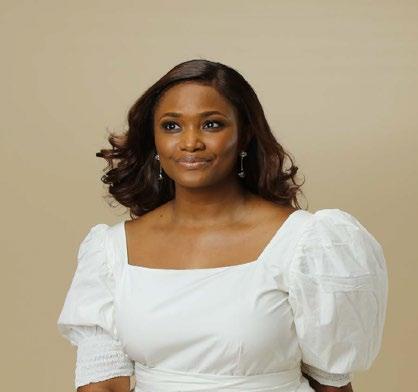
With the rise of artificial intelligence (AI) today, it has become a tool that various industries use. For instance, in the medical field, it has been known to diagnose diseases in people. AI allows financial organisations to swiftly and efficiently examine big datasets and reach well-informed conclusions. You can access any information you want through AI.




The fashion industry isn’t left out, as AI is now a crucial component of the industry’s progress, having transformed everything from design to consumer experience. AI allows fashion houses to remain ahead of the rapidly evolving industry by examining data from social media, fashion shows, and customer behaviour to forecast future trends. Thanks to AI, consumers can preview how clothes will fit without trying them on. In the past, mostly celebrities could afford to hire a personal stylist, but now, AI-powered platforms and apps have democratised this service by serving as virtual stylists that can be tailored to each client’s demands. It’s really interesting what AI can do with the fashion industry; read more on pages 8 to 10.
Last week Sunday, we made an error in publishing a story implying a romantic relationship between two parties without verifying the facts. We have come to understand that the story is completely inaccurate and is against our culture and principles at THEWILL DOWNTOWN.
We sincerely apologise for this misinformation and any harm or embarrassment caused to the parties reported.
To our dear readers, thank you for your continued trust in THEWILL DOWNTOWN Magazine. We remain dedicated to providing you with wellresearched and responsible journalism.
Until next week, enjoy your read.







SUNDAY, FEBRUARY 9, 2025





SUNDAY, FEBRUARY 9, 2025



BY AMOS ESELE
Judging from the unfavourable public reception of media reports that the House of Representatives was proposing the creation of 31 states, its leadership had to immediately issue a clarification on Thursday, February 6, 2024.
The proposals were submitted as private members’ bills, they said, adding that the proposals do not represent the official position of the House.
“The process of creation of states has a constitutional provision to it,” Honourable Akin Rotimi, Jr., spokesperson of the House of Representatives further explained to THEWILL on Friday.
He added that, “The House Committee on the Constitutional Review collates memoranda from all over Nigeria. As of now, we have 350 different memoranda, and you know any memoranda has to be sponsored by an individual serving member or a senator. What the Deputy Speaker said on Wednesday (February 5, 2024) was that before members make their submissions, they have to meet the constitutional criteria without which the proposals cannot be entertained.”
Investigation confirms this trend. Members appear to sponsor bills without following the constitutional and legislative provisions, which suggests some hidden motives for such sponsorship.
The standard criteria for agitation for state creation in Nigeria rests on addressing historical, communal, geographical imbalances. But some lawmakers with motives for political control and dominance are said to be ready to game the system.
THEWILL recalls that on June 11, 2024, for instance, a bi-partisan bill seeking to create Etiti State from the five South-East states passed second reading in the House of Representatives. Sponsored by five lawmakers from the South-East geo-political zone, namely, Amobi Ogah (LP, Abia), Miriam Onuoha (APC, Imo), Kama Nkemkama (LP, Ebonyi), Chinwe Nnabuife (YPP, Anambra), and Anayo Onwuegbu (LP, Enugu), the bill, which was debated during a plenary session after a debate on its general principles, sought to amend Section 3(1) of the 1999 Constitution to increase the number of states from thirty-six to thirty-seven by inserting “Etiti” immediately after “Enugu.”
Section 3(1) of the 1999 Constitution of the Federal Republic of Nigeria states that there shall be 36 states in Nigeria.
This intention of this bill that aimed to carve out a new state from the five South-east states of Abia, Enugu, Anambra, Ebonyi, and Imo, and to comprise 11 local government areas with Lokpanta as the designated capital, was, according to Rep Ogah proposed to, “address a longstanding issue of regional parity and administrative efficiency within the South-east geopolitical zone of Nigeria.”
Currently, the southeast region has the lowest number of states in Nigeria, five. All other regions-the Southsouth, Southwest, Northcentral, Northeast - have six states each with the Northwest as the only one composed of seven states.
However, after Speaker Abbas Tajudeen put the bill to






The Clerk to the House Committee on Constitutional Review issued a clarification statement to clarify issues raised in media reports on the proposed 31 new states. The statement which was obtained by this newspaper said the media reports contained some inaccuracies and misrepresentations of the legislative process. It was signed by Hon. Rotimi Jr.
In it, he explained that during plenary on Thursday, February 6, 2025, the Deputy Speaker, who also serves as the Chairman of the House Committee on Constitution Review (HCCR), announced that the Committee had received 31 proposals for the creation of new states.
These proposals, he said, submitted as private member bills, do not represent the official position of the House.
“The mandatory constitutional requirements for such bills to progress to the next stage of legislative scrutiny were read out by the Deputy Speaker for the notice of Members and onward action.
“The Committee has reviewed the proposals for the creation of new states in accordance with Section 8(1) of the Constitution of the Federal Republic of Nigeria, 1999, (As Amended). This section outlines specific requirements that must be fulfilled to initiate the process of state creation which include the following:
New States and Boundaries; An act of the National Assembly for the purpose of creating a new state shall only be passed if (a) It is supported by at least a two-thirds majority of members representing the area demanding the new state in each of the following: the Senate and House of Representatives, the House of Assembly in respect of the area, and the Local Government Council in respect of the area, as received by the National Assembly.”
Regarding proposals for the creation of new Local Government Councils, he added, “Specifically, in accordance with Section 8 (3) of the Constitution, the outcome of the votes of the State Houses of Assembly in the referendum must be forwarded to the National Assembly for fulfilment of state demands.”
The communication, he added, further directed that proposals shall be resubmitted in strict adherence to the stipulations. “Submit three hard copies of the full proposal of the memoranda to the Secretariat of the Committee at Room H331, House of Representatives, White House, National Assembly Complex, Abuja, not later than Wednesday, March 5, 2025,” he said.
“For the avoidance of doubt, as with all constitutional amendment proposals, these submissions will undergo thorough legislative scrutiny, including public hearings, stakeholder engagements and multiple levels of approval before any constitutional changes can be effected.
“It must be noted that the Deputy Speaker, in his capacity as Presiding Officer at today’s plenary, read the announcement as a communication from the Clerk of the Constitution Review Committee, which he chairs. The Committee will align with constitutional provisions and will only consider proposals that comply with the stipulated guidelines.
“Additionally, the House remains committed to a transparent and inclusive constitutional review process that reflects the will of the Nigerian people.”
The proposed states currently before the National Assembly include Okun, Okura and Confluence from Kogi; Benue Ala and Apa from Benue; FCT State; Amana from Adamawa; Katagum from Bauchi; Savannah from Borno; Muri from Taraba; New Kaduna and Gujarat from Kaduna State; Tiga and Ari from Kano; Kainji from Kebbi;
Etiti and Orashi as the sixth states in the South-East; Adada from Enugu; and Orlu and Aba.
Others are Ogoja from Cross River, Warri from Delta, Ori and Obolo from Rivers, Torumbe from Ondo, Ibadan from Oyo, Lagoon from Lagos, and Ogun, Ijebu from Ogun, and Oke Ogun/Ijesha from Oyo/Ogun/Osun States. If Anioma and Etiti that have passed second readings in the National Assembly are included, the numbers add up to 33.
of the ruling party in the creation of Anioma state. If Anioma State is created—which I am fighting for—it will be a reality because APC leaders have assured me of their commitment.”
Senator Nwoko failed to answer repeated calls to his phone, seeking further explanation. So did Rep Ikenga Ugochinyere.

One of the reasons for kicking against further creation of states, at least for now, is the question of viability. According to the National Bureau of Statistics, economic viability of any state is often measured by its Internally Generated Revenue. In its recent report published in October 2024, the body listed economically viable states in Nigeria as seven. They are Lagos, Ogun, Rivers, Kaduna, Kwara, Oyo and Edo.
The NBS and the Federal Account Allocation Committee (FAAC) report showed that while Lagos received the sum of N370.9 billion from the Federation Account and generated N651 billion as Internally Generated Revenue (IGR), Ogun on the other hand, received N113.4 billion from the Federation Account and generated N120.5 billion internally.
On the other hand, Rivers State received N363.4 billion from the Federation Account and generated N172 billion while Kaduna received N155 billion and generated N58 billion.
Also, Kwara received N99 billion and generated N35.7 billion; Oyo received N181 billion and generated N62 billion, while Edo received N147 billion in federal allocation and generated N47.4 billion.
The total IGR of N1.5 trillion from the seven most viable states was almost twice the total IGR of 29 states together that merely generated about N650 billion.
LAWMAKERS TAKING THE SHORTCUT
Still, for political reasons, many senior lawmakers habour the propensity to bypass this constitutional and legislative provisions, however cumbersome. Take Senator Ned Nwoko, (PDP, Delta North) for example. Last Wednesday, he said one of the reasons he defected from his party to the governing All Progressives Congress, was to consummate the promise for the creation of Anioma State, an age-long political pursuit.
He said, “I left because I want to be able to get the support
If you were the president, would you create a state and give it to the opposition? You know that the answer to that question is not far-fetched if you want to be dispassionate. It is very clear “
However, the Chief of Staff to Senator Nwoko, Dr Michael Nwoko, explained that the senator actually lobbied President Bola Tinubu over the creation of Anioma State before he defected from the PDP to APC, last week.
“He engaged with the President over the Anioma State creation,” Dr Michael told THEWILL in a brief interview. “Before you get such things done in Nigeria, you have to lobby at the federal level. That is the true essence of the representative of the people. Creation of Anioma State is going to be the biggest legacy for him. So, he is very much in touch with the President of the Federal Republic of Nigeria.”
Asked if he knew why the Senator would prefer to lobby before fulfilling the constitutional provisions for the creation of the envisaged state, Dr Michael posed a question in reply.
“If you were the president, would you create a state and give it to the opposition? You know that the answer to that question is not far-fetched if you want to be dispassionate. It is very clear.
“So, the senator wants to own the state and become its governor or the godfather in control?” he was asked. He replied that Senator Nwoko has made his intentions clear that he was not interested in becoming governor of an Anioma State.
“He is even advocating someone from the Ndokwa area of the envisaged state to be governor so as to correct the economic deprivation of the area for a very long time.
“According to him, Ndokwa is the most underdeveloped area in the North Senatorial Constituency being represented by the Senator, despite it having six out of the nine local governments in the constituency, which produce oil and gas. So, the senator is not nursing any inordinate ambition as far as Anioma is concerned,” he said. But when pressed further, he literally caved in.
“Power belongs to God,” he said, adding, “By the time Anioma is created, God will determine who becomes governor. After all, there will be a lot of things that would be done during the period after its creation; things like boundary delineation for proper election, democratic imbalances that need to be put right and so on.”
He however admitted that constitutional and legislative processes towards the realisation of the creation of the state are still ongoing. These include the sponsorship of the bill by Senator Nwoko and a recent retreat in Kano by the Joint Committee of Constitutional Amendment during which the proposals on state creation were discussed exhaustively.
“The bill on the creation of Anioma State has passed second reading,” he said and argued that with the oil and gas reserves in the proposed state, the worry about its viability was out of the question.
Hon Rotimi Jr, who said he would prefer not to engage in any discussion of political motivation on the part of the sponsors of bills on state creation among federal lawmakers, however, said, “People have different reasons for sponsoring bills. I would not comment on that except to say that the Constitution has specified the inclusive process to go about it. People have talked about historical imbalances as in the southeast that has five states. All over Nigeria, there have been some reasons as well. One cannot preempt the reasons why certain people are sponsoring a bill, but the constitution has made it difficult to carry it out without following an inclusive process.”

R-L: APC National Chairman, Dr. Abdulahi Ganduje; Imo State Governor, Sen. Hope Uzodimma; his wife, Chioma; Minister of Women Affairs, Imaan Suleima-Ibrahim and UNICEF Rep., Ibrahim Sise, during the commemoration of the International Day for Zero Tolerance for Female Genital Mutilation, held at Rockview Hotel, Owerri on February 6, 2025.

BY FELIX IFIJEH
General Hydrocarbons Limited (GHL), owners and operators of OML 120, Deep Offshore Nigeria, says it remains open to mediation but will continue to fight for justice and damages against First Bank of Nigeria (FBN) in resolving the ongoing dispute between the two companies.
GHL stated this in an explainer released to THEWILL on Friday. Titled “GHL vs FBN: The Facts, The Half-Truths and The Fiction”, GHL insisted that FirstBank reaped benefits from their oil field agreement while failing to uphold its part of a deal which required the Bank to finance GHL’s development of the Oil Mining Lease (OML) 120.
According to GHL, First Bank approached the company with a financing arrangement to fund the exploration, development, and production of the oil field. Under the terms, both parties agreed to share profits equally. Also, FBN was to receive its financing costs while using its share of the profits to offset a $600m non-performing loan, a liability discounted from $718m under the Asset Management Corporation of Nigeria’s (AMCON) eligible bank asset programme.
GHL, in an explainer, insisted that its agreement with First Bank played a huge role in stabilising the bank’s financial health.
As part of a tripartite agreement involving GHL, FBN, and AMCON, GHL provided a guarantee for FBN’s liability to AMCON. This allegedly helped FBN recover from financial distress, turning its books from a loss of N302bn to a profit of N151 billion in its 2021 financial year-end report. However, despite allegedly benefiting from the deal, GHL noted that First Bank failed to fulfil its obligations under the agreement.
The explainer reads: “Is GHL’s liability to First Bank a loan?
(discounted from $718 million from AMCON’s Eligible Bank Asset) in order to resolve FBN’s solvency issues. In doing that, GHL guaranteed FBN’s liability to AMCON through a Tripartite Agreement between GHL, FBN and AMCON.
“The result of the Tripartite Agreement was that FBN became immediately profitable and moved from a loss of N302 billion to a profit of N151Bn for 2021 FYE. However, in return, it has failed to meet its commitment under the Tripartite Agreement to fully finance and make the payments required for the optimal exploration and development of OML 120 as agreed in the Tripartite Agreement, resulting in losses in day rates and downtimes of $47 million, which has snowballed into the current impasse as FBN has failed to make further required payments for the drilling and exploration of OML 120. Essentially, FBN failed to fulfil its condition precedent to profitability in failing to finance OML 120 as agreed, leaving its financial statements open to challenge.
“Meanwhile, the FBN’s claim of a $225 million loan is not due as it is still covered by the moratorium, given that the project has not achieved commercial production. So, at best, FBN’s claim is premature.
“GHL has now gone for Arbitration which is ongoing and FBN has gone to court with a series of Ex Parte (temporary) Mareva measures, the first of which has been vacated and the case is now being heard on the merit, whilst the second temporary Mareva is pending at the Federal High Court in Port-Harcourt, Rivers State, both supported by” wild, unfounded and unproven allegations of dissipation of assets.”
BY JOSEPH AMEDU, LOKOJA
Kogi State Government has signed a Memorandum of Understanding (MoU) with Pora Films to establish Kogi Television, the state’s first-ever television station.
Signing the MOU on behalf of the state government, the Secretary to the Government of Kogi state, (SGS), Dr. Folashade Ayoade Arike, said the historic partnership marks the beginning of a new era in Kogi’s media landscape, bridging a 33-year gap as the only state in Nigeria without its own TV station.
According to her, the project goes beyond broadcasting, aiming to showcase Kogi’s culture, promote investment opportunities, and give the state global visibility.
She said the Ministry of Information and Communications will play a crucial role in coordinating the launch of Kogi Television, ensuring the project is executed with professionalism and efficiency.
“For many years, Kogi remained the only state in Nigeria without its own television station. Today, under the visionary leadership of His Excellency, Alhaji Ahmed Usman Ododo, the Chief Servant of Kogi State, that gap is being bridged.”
“The state government has expressed full confidence in Pora Films’ expertise to deliver a world-class television station, rivalling leading broadcast platforms like DSTV and Startimes.”
The simple answer is NO, as it is not a normal commercial loan: it is a Project Finance relationship. Here is how:
“GHL is the awardee and licenced operator of OML 120. FBN approached GHL to finance the exploration, development and production of OML 120 and share profit 50:50 while paying FBN the cost of finance. The FBN’s 50% share is dedicated to paying down its non-performing loan of $600 million
“Did GHL dissipate any assets? The answer is no, as all payments were made by First Bank DIRECTLY to 3rd parties after due diligence and verifications by FBN, and the 3rd parties are mainly global, world-class, reputable companies with strict compliance regimes. “GHL is filing a claim of over $1 billion in various courts, while FBN is claiming $225 million debt which it never complied with in line with the agreements.
“GHL will continue to fight for justice and damages whilst it remains open for mediation and resolution.”

“The partnership is expected to drive development and investment in Kogi State, serving as a voice for the people and a beacon of progress and innovation,” she added.
The MOU signing ceremony was attended by top government officials, including the Secretary to the Government of Kogi State, Pastor (Mrs) Folashade Arike Ayoade (PhD), and the State Commissioner for Information and Communications, Honourable Kingsley Fanwo.




L-R: Deputy Governor of Lagos State, Dr. Obafemi Hamzat; Governor of Lagos State, Babajide Sanwo-Olu; Managing Director, Lagos Water Corporation, Engr. Mukhtaar Tijani; Contractor/Project Manager, Engr. Daniele Cifola and Special Adviser to the Governor on the Environment, Engr. Olakunle Rotimi-Akodu, during the governor’s working visit to the Adiyan Waterworks in Lagos on February 5, 2025.

Members of a neighbourhood watch operating on Ngwa Road by the Old Court in Aba, the Abia State commercial nerve centre, have apprehended a man in his 20s about to vandalize the Aba Power power distribution infrastructure in the locality.
The man, Uchenna Iroha, was arrested when he was to start stealing the 500kva distribution transformer in the area without knowing that eagle-eyed security men had been monitoring him, according to Engr Ken Agu, the Chief Security officer of the Geometric Power group, the owner of the Aba Power Electric Company.
“Uchenna, an indigene of the Ohuhu community in Umuahia, the Abia State capital, has for some time been suspected of involvement in the vandalism against the distribution transformer on two previous occasions in recent times”, explained Edise Ekong, the Aba Power Brand and Communications Manager, in a statement.
Efforts are being made to find out if the suspect is a lone wolf or has been working in concert with other vandals, noted Ekong, quoting the Geometric Power security chief as saying.
“The Divisional Police Office of the Nigeria Police Force at Ndiegoro in Aba is thorough and we expect its men to do a good job”, Engr Agu said.
The Aba Power communication manager commended the host community where the 500kva transformer is located for guarding it well after two previous acts of vandalization in recent months.
Edise remarked that each theft left the community, businesses, and households in darkness for days until the facility was repaired at a huge sum.
“It is terrible to mess up the businesses and lives of people here by a handful of miscreants who sell the transformer copper wires and other electrical accessories to unconscionable electrical parts dealers and metal scavengers as scraps”, observed Engr Agu.
“We are delighted that as the power supply to Aba and the environs improves drastically and Aba Power earns the confidence of the people more and more, the people will continue to play their role as stakeholders in the electricity value chain and protect all the infrastructure in their areas with more commitment”.
BY ABDULLAHI YUSUF


Astalwart of the All Progressives Congress in Kano State, Musa Kwankwaso, has advised the National Security Adviser, Mallam Nuhu Ribadu, and other key officials in President Bola Tinubu’s administration to remain focused on their responsibilities and not be distracted by opposition criticisms.
Kwankwaso, in a statement issued in Kano on Friday, urged Ribadu to stay committed to his mandate of securing lives and property across the country, stressing that attacks from political adversaries should not derail the administration’s objectives.
“Ribadu should remain focused on his task of ensuring security for all Nigerians, just as other officials of the Tinubu administration should concentrate on their assigned duties. They should not be distracted by opposition attacks,” the statement read.
He commended the NSA for his efforts in combating insecurity, noting that under Ribadu’s leadership, several previously unsafe areas have been reclaimed, while hundreds of bandits, Boko Haram insurgents, and other non-state actors have been neutralized or forced to surrender.
Kwankwaso alleged that some opposition figures, including former Kano State Governor, Dr. Rabiu Musa Kwankwaso, were unsettled by Ribadu’s achievements in restoring security.
“They are not happy because the NSA and other top officials are making President Tinubu’s administration proud with their outstanding performance. But this should not bother them,” he added.
On the political landscape in Kano, Kwankwaso asserted that the APC was gaining momentum, pointing to recent highprofile defections as evidence of the party’s growing strength.
“Just recently, former commissioners from the New Nigeria Peoples Party (NNPP)-led Kano State government were received into the APC by the Deputy Senate President, Senator Barau Jibrin. This development did not sit well with Dr. Rabiu Kwankwaso,” he claimed.
He maintained that more defections from the NNPP to the APC were expected as the party strategizes to reclaim power in Kano come 2027.
“We will continue to welcome more members from the NNPP as we position ourselves for victory in the next election. By the grace of God, we will recapture Kano State,” he declared.

BY FELIX IFIJEH
The National Agency for Food and Drug Administration and Control (NAFDAC) has called for strict measures including the death penalty for fake drug peddlers.
The agency’s Director-General, Mojisola Adeyeye, made the call on Friday when she was featured on Channels Television’s ‘The Morning Brief’.
THEWILL recalls that a former NAFDAC DG, Paul Orhii, had revealed a proposed bill seeking the death penalty for fake drug dealers.
According to the NAFDAC DG, “In the proposed new law, we will strongly advocate the death penalty or lifetime jail term for manufacturers and distributors of fake drugs, especially in situations where it is determined that such medicines proximately caused death or severe bodily injury. We will also seek to provide in the new law, a cause of action for victims of counterfeit drugs and actively encourage and assist victims to gather evidence to enable them to successfully sue manufacturers and distributors of these deadly products for adequate compensation and punitive damages to serve as deterrent to others.”
Calling for the support of all stakeholders on Friday, Adeyeye called for the cooperation of the judiciary and the National Assembly to make the proposal a reality.
Adeyeye, who highlighted the challenges of the agency in its war against fake drugs, said, “There are no strict measures to stop offenders from repeating the same crime”, charging the judiciary to be strong and firm.
“So, our judicial system must be strong enough. We are working with the National Assembly to make our penalties much stiffer. But if you kill a child with bad medicine, you deserve to die.
“Someone brought in 225mg of Tramadol, which can kill a person or fry their brain, and the punishment is just five years in prison or a fine of N250,000. Who doesn’t know that a person can simply withdraw N250,000 from an ATM?” she said.
Lamenting the impact of fake drugs, Adeyeye said, “Somebody bought children’s medicine for about N13,000, while another person was selling it for around N3,000 in the same mall. That raised an alarm. Guess what? When we tested the medicine in our Kaduna lab, there was nothing inside. So, I want the death penalty.
L-R: President, Network of People Impacted by Cancer in Nigeria, Gloria Nwajiogu; Former Commissioner of Health, Cross River, Dr. Janet Ekpenyong; Breast Cancer Survivor, Mrs Mide Agboola and Head of Research and Publication, Athena Centre for Policy and Leadership, Dr. Uzor Ngoladi, during the 2025 World Cancer Day Symposium, organised by the Project Pink Blue Health and Psychological Trust Fund in Abuja on February 4, 2025.

The Inspector-General of Police, Kayode Egbetokun, has appointed Commissioner of Police Abayomi Shogunle as the head of the Special Intervention Squad, Elections Planning, Monitoring & Evaluation Unit, and the Safe School Protection Squad.
A statement by the Force Public Relations Officer, ACP Olumuyiwa Adejobi, on Thursday, described the appointment as a strategic move to enhance internal security and improve the police response to violent crimes.
Shogunle, a seasoned officer with vast experience in operations and public relations, is expected to lead the SIS in tackling security challenges nationwide.
He will also oversee election monitoring and the protection of schools against attacks.
In a related development, the IGP has also
appointed CSP Chima Ogarashi as the new Force Marine Officer, a position crucial to security operations along the nation’s inland waterways.
Adejobi noted that Ogarashi, an expert in maritime security and law enforcement, would be responsible for strengthening the Force’s marine operations.
“These key appointments come at a critical time as the Nigeria Police Force prepares to deploy 25 newly acquired gunboats and intensifies efforts to secure additional maritime safety equipment.
“These assets are part of a proactive approach to improving security on the country’s waterways,” the statement read.
The police chief reiterated the force’s commitment to safeguarding lives and property, assuring Nigerians of a more effective response to security threats.
BY TUNDE OMOLEHIN, SOKOTO
No fewer than 10 worshippers, including an imam, have been abducted by suspected terrorists in Bushe community, Sabon Birni Local Government Area of Sokoto State.
The state Police Public Relations Officer, DSP Ahmed Rufai, confirmed the incident at the weekend, saying security operatives were working to secure the victims’ release.
A resident, who spoke on condition of anonymity, said the assailants struck during the early morning prayers at the community mosque on Thursday, January 6, 2025.
“The gunmen invaded the mosque around 4:30 am, abducting the imam and other worshippers before
escaping into the forest,” he said.
He lamented that the community had suffered repeated attacks despite the presence of security personnel.
The source added that the timely intervention of security forces, including troops of the Nigerian Army, prevented further casualties and a possible mass abduction.
A member of the Sokoto State House of Assembly, representing Sabon Birni ‘B’ Constituency, also confirmed the attack, saying at least 10 people were taken away.
He, however, commended the security agencies for their swift response, adding that efforts were underway to rescue the victims.
Borno State Governor, Babagana Zulum, has approved the procurement of 54 patrol vehicles and motorcycles to bolster military operations in New Marte, a volatile area in the northern part of the state battling insurgency.
Zulum made the announcement on Thursday during a visit to New Marte, where he assessed the security situation and laid the groundwork for the resettlement of displaced communities.
The approved security logistics include four Buffalo Toyota pick-up trucks, 50 operational motorcycles, and surveillance facilities to enhance mobility and intelligence gathering for troops stationed in the region.
The governor commended the military for their unwavering commitment in restoring peace, acknowledging their sacrifices in the fight against insurgency.
He expressed optimism that the renewed support would strengthen security efforts and facilitate the gradual return of normalcy.
On his return from Marte, Zulum stopped over in Dikwa, where he inspected key infrastructural projects, including the High Islamic College, the General Hospital, and newly built semi-permanent shelters designed to accommodate returning displaced persons.
The governor reaffirmed his administration’s commitment to security, resettlement, and development, emphasising that efforts would continue to rebuild communities affected by the insurgency.




BY FELIX IFIJEH
The Independent Corrupt Practices and Other Related Offences Commission has arrested a former Chief of Naval Staff, Vice Admiral Usman Jibrin (rtd), and Adam Yusuf, a Deputy Commandant of the Nigerian Security and Civil Defence Corps in Kogi State, over alleged diversion of more than N3 billion.
A statement issued on Friday by ICPC’s Director of Public Enlightenment and Education, Demola Bakare, said “Yusuf, who was at large until now, was taken into custody from his Gwagwalada, Abuja residence and is set to face prosecution”.
The statement added, “Investigation revealed that former Chief of Naval Staff, Vice Admiral Usman Jibrin (rtd.), allegedly orchestrated
the fraud through Yusuf and former Brigadier General Ishaya Bauka Gangum (rtd.).
“The alleged scheme reportedly involved the diversion of public funds using 92 fictitious companies that were not registered with the Corporate Affairs Commission (CAC).
“An investigation by the ICPC traced these funds to Lahab Integrated, Gate Coast Properties, and other affiliated companies, leading to the acquisition of over 18 properties, including filling stations.
“Four of these properties have been forfeited to the government so far, while legal proceedings continue over the remaining assets. The ICPC is also intensifying efforts to apprehend other suspects at large.”
BY AMOS OKIOMA
The inaugural edition of the Niger Delta Sports Festival has received a significant boost as the Akwa Ibom State Government affirmed its readiness to host the event.
Governor Umo Eno made the declaration on Thursday during a courtesy visit by a delegation from the Niger Delta Development Commission led by its Managing Director, Dr. Sam Ogbuku.
The delegation, which included the Executive Director, Sector Directors, and project consultant, Dunamis Icon, briefed the governor on the festival’s objectives and plans for its successful execution.
Expressing gratitude to the NDDC for initiating the festival and selecting Akwa Ibom as the host state, Eno assured that the state government would fully support the event.
“We thank you for the privilege to host. Your visit shows your seriousness, and there is no way we will reject it,” he stated.
The governor emphasised that the festival would not only promote unity in the Niger Delta but also stimulate economic activities, boosting businesses such as hotels, food vendors, and transportation services.
“We will set up a small committee to work with you to ensure the event’s success. We look forward to welcoming the Niger Delta, and together, we will have a great time,” he added.
On the availability of sports facilities, Eno acknowledged the contributions of past administrations in building world-class infrastructure.


BY ABDULLAHI YUSUF
Governor Abba Yusuf of Kano State has approved the establishment of the Kano State Consumer Protection Council to safeguard consumer rights and promote fair trade practices across the state.
A statement issued on Saturday by the governor’s spokesperson, Sunusi Bature Dawakin Tofa, said the council comprises professionals, government officials, and business representatives, all tasked with ensuring a transparent and consumer-friendly market environment.
According to Dawakin Tofa, the council will work to prevent consumer exploitation and uphold ethical business standards.
The newly constituted council will be chaired by Dr. Umar Haruna while Zangina Jafaru will serve as the Executive Secretary.
Yusuf emphasised that the council’s core mandate is to protect consumers from substandard goods, fraudulent trade practices, and unethical business dealings.
He reiterated that the initiative aligns with his administration’s vision of fostering market confidence and good governance in Kano State.
He directed the council to commence operations immediately, addressing consumer complaints, enforcing trade regulations, and ensuring a fair and competitive business environment.
“These facilities have been developed through the efforts of successive administrations. The Godswill Akpabio Stadium, built by our current Senate President, has stood the test of time. It also requires great effort to maintain and sustain it,” he noted.
In his remarks, Dr. Ogbuku explained that the Niger Delta Sports Festival aims to foster regional integration, showcase the Niger Delta as a leader in Nigerian sports, and create opportunities for young athletes to pursue professional sporting careers.
“The Niger Delta is a powerhouse in Nigerian sports. The region has produced great sports legends, but if we fail to sustain that legacy, we risk decline,” he said.
The sports festival is scheduled to hold from April 1 to 8, 2025 in Uyo.
The event will kick off with state trials and a selection process, beginning from the local government areas and extending across the 85 federal constituencies within the region.

BY KUDJE ANOLI
Senator Ned Nwoko’s defection from the Peoples Democratic Party, PDP, to the All Progressives Congress, APC, is having the additional impact of bringing the prolonged leadership crisis in Delta State chapter of the APC to an end.
Like clockwork, Senator Nwoko who formally announced his defection in a letter to his colleagues through the President of the Senate, Godswill Akpabio, last Wednesday, followed it up with a visit to the National Chairman of the APC and members of the party’s National Working Committee, NCW, in Abuja.
Senator Nwoko who said that his decision to defect “was not made lightly, but after deep reflection and extensive consultations with my constituents, political associates and stakeholders across the Delta North Senatorial District,” following, “unresolved conflicts” with the PDP, which “have weakened its ability to function as an effective opposition, thereby threatening the very fabric of our democracy,” paid a visit to the APC National Chairman, Abdullahi Ganduje in company with a delegation led by the Minister of Aviation and Aerospace Management, Festus Keyamo.
Other members on the delegation last Wednesday were Senator Joel Onowakpo-Thomas and Senator Ede Dafinone, Nwoko’s colleagues from Delta South and Central Senatorial Districts, respectively. Instructively, the brief presentation ceremony which was officiated by Keyamo was attended by all members of the National Working committee, NWC, as well as Stella Okotete, former National Women’s Leader of the party and the Delta North Senatorial Chairman of APC.
According to Hon. Keyamo, “This development marks a new chapter in Senator Nwoko’s political journey and his membership in the APC is expected to significantly impact the party’s policies and direction in the coming years. The coming of Senator Ned Nwoko into the party would be of great advantage to the party in future elections.” The high point of that visit was the photo session, which made headlines the next day. The pictures showed Keyamo and National Chairman, Ganduje, raising the hands of Senator Nwoko to the cheers and applause of all party officials and stakeholders from Delta State Chapter of the party.
A dependable party source told this newspaper that the session was a vital optics to the recent position of the reconciliation committee on the ongoing supremacy battle in the state chapter between Keyamo and the former Deputy President of the Senate, Ovie Omo Agege, who was also the governorship candidate of the party in the 2023 general election.
In fact, Ganduje’s statement while welcoming Senator Nwoko to the party to the effect that with all the three Delta senators on their side, the ruling party is more than certain to win over Delta at the next governorship election, is being referenced as a win for Keyamo’s leadership of the party in Delta State.
Ganduje said, “We know our chapter in Delta will also implement internal democracy. We therefore, request you, the stakeholders, to come together to cooperate. We had two out of three senators before and now have the entire three in Delta. As we promised, we will take over Delta State.”
Thus, Senator Nwoko’s defection has immediately impacted the party such that leadership tussle can be said to have ended. The point at issue in the state chapter of the party had been the question, who between a serving minister, in this case Keyamo and a former senator representing Delta Central and a former Deputy Senate President, Omon-Agege, should be recognised as the party’s leader in the state.
When he was Deputy President of the Senate, Omo-Agege was unquestionably the leader. He was the highest- ranking member of the party from the state. His opponents argue that he cannot continue to cling to that position forever. Currently, even the elected representatives and senators from the state do not have such ranking Omo-Agege once enjoyed. Rather, his opponents maintained, Keyamo, by virtue of his appointment as a minister
makes him a natural choice for the leadership position of the party in the state.
The resulting conflict had intensified and factionalised the party, with various party leaders from across the state engaging in constant verbal war in support for or against their choice.
To intervene and restore order, the NCW set up a reconciliation committee led by the Olorogun O’tega Emerhor. But sooner had the committee submitted its report recognising the leadership role of appointed or elected members of rank from the state, that all hell was let loose. Senator Peter Nwaoboshi, who once represented Delta North before Senator Nwoko, opposed the recommendations of the O’tega Emerhor’s committee. He even played down the importance of Senator Nwoko’s defection.
A political ally of Omo-Agege, Nwaoboshi accused the Emerhorled committee of deepening divisions instead of resolving the differences among the party’s leaders following the last election. Nwaoboshi said, “As someone with a long history in politics, I know the importance of adhering to party constitutions. Unfortunately, the committee is proposing leadership structures that are not recognised by our party’s constitution, which is a recipe for chaos.
“The recommendation for Senator Ovie Omo-Agege, the APC’s 2023 governorship candidate, a former Deputy President of the Senate and the number six man, to co-chair the party’s leadership with a serving minister contravenes Nigeria’s order of precedence, which places a senator above a minister. As a former Deputy President of the Senate, Omo-Agege cannot co-chair with a minister.” He argued that such a move would undermine the integrity of the party’s hierarchy, considering the fact that Omo-Agege was a member of the National Executive Council (NEC) of the APC, as Deputy President of the Senate and currently a member of the Caucus.
“This crisis predates some of us joining APC. There were two factions led by Omo-Agege and Barrister Festus Keyamo. The OmoAgege group prevailed in the last congress, but now the Keyamo faction, emboldened by a ministerial appointment, is trying to assert dominance. This is unacceptable,” Nwaoboshi lamented. Also, Nwaoboshi is critical of Nwoko’s defection to the APC. He accused the Senator of plotting to dissolve the Delta APC executive.
Nwaoboshi, said, “I have been made aware that Senator Ned Nwoko, who recently announced his planned defection, is secretly plotting with some elements in the Presidency to dissolve the Delta State APC Executives from state to wards before their tenure expires. The plot is unconstitutional and motivated by personal gain, the moves disregard the democratic principles which our party upholds and disrespects the rights of the duly elected members of the Delta
As things stand in the party in Delta State, Keyamo now enjoys the support of all critical stakeholders of the party in Delta APC, particularly, the three senators, some Representatives, especially Francis Ejiroghene Waive from Omo-Agege’s constituency, Ughelli North/Ughelli South/ Udu House of Representatives at the National Assembly

State APC Executive.” However, a member of the O’tega Emerhorled Delta APC reconciliation committee and former Minister of Niger Delta Affairs and APC chieftain, Godsday Orubebe, has disagreed with Nwaoboshi’s critical statements, describing them as “unfortunate and lacking merit and moral right”.
Orubebe disclosed that Nwaoboshi, as a member of the reconciliation committee, failed to actively participate in its activities, including meetings and consultations. He said, “Ordinarily, Senator Peter Nwaoboshi has no moral right to comment on the committee’s report. He was a member of the committee but never attended any of the meetings or visitations.
“To ensure inclusivity, we even visited him in his home, but he remained nonchalant. This is the very first time a committee has boldly provided actionable ideas to move Delta APC forward. When the constitution fails to resolve crises, conventions are used “This has worked at international levels and in other parts of Nigeria. Senator Nwaoboshi’s position is not only wrong but also uninformed. Politics is about managing people and their interests.” “You can’t do it alone. You must work toward the common interest of the people, and that is the strength of the Emerhor-led committee’s report. It positions the party to face future battles. Let us appreciate what is good and realistic rather than condemn efforts based on unfounded reasons,” Orubebe stated.
Meanwhile, the leadership of the All Progressives Congress, APC, in Delta State has congratulated Senator Nwoko on his decision to join the party. The state party chairman, Elder Omeni Sobotie, praised Nwoko for taking the decision and assured him that the party would accept him unconditionally because of his unwavering dedication to the welfare of the people of Delta State.
He said, “Nwoko’s decision to align with the APC signals a strategic step towards bringing about positive change and good governance for the people of Delta State,” Sobotie said, adding that Nwoko’s presence in APC will serve as a catalyst for the much-needed reforms and progress in Delta State, as his influence and extensive network will undoubtedly bolster the party’s strength in the state, “further solidifying our commitment to creating a better future for all Deltans.”
As things stand in the party in Delta State, Keyamo now enjoys the support of all critical stakeholders of the party in Delta APC, particularly, the three senators, some Representatives, especially Francis Ejiroghene Waive from Omo-Agege’s constituency, Ughelli North/Ughelli South/Udu House of Representatives at the National Assembly.



















10X5 N650, 000
10X4 N600, 000
10X3 N500, 000
9X6 N440, 000
9X5 N395, 000
9X4 N335, 000
9X3 N310, 000

8X6 N410, 000
8X5 N380, 000




7X5 N320, 000
7X4 N315, 000

6X5 N280, 000

6X3 N145, 000
6X2 N85, 000
5X2 N70, 000
4X4 N160, 000
4X3 N95, 000
4X2 N65, 000
3X3 N60, 000
3X2 N50, 000
2X2 N30, 000
2X1 N15, 000 1X1 N7, 000
























D V E R T I S E M E N T R A T E EFFECTIVE APRIL 1, 2024



Front Page Strip– 4x6 – N1, 400, 000
Front Page Strip 3x6 – N800, 000
Change of Name (Classified) N5, 000
Page/Column Branding – Negotiable
























The viral video showing the now suspended traditional ruler of Orile Ifo in Ogun State, Abdulsemiu Ogunjobi, assaulting a 73-year-old man, Areola Abraham, speaks to overwhelming impunity at all levels of authority in the country today.
The conduct of the traditional ruler was not only demeaning to royalty, but also calls into question the process of his elevation to the throne.
Apart from raining abuses on his victim who was seen kneeling and prostrating, the ruler’s choice of words reflects his character and indeed, taints the very institution of traditional rulership which he represents.
The following words are not only a betrayal of the confidence and respect his subjects have for him, but also mud splashed recklessly on traditional institutions in the state: “You’re a traitor who won’t enjoy the fruits of your labour. You’ll lose your family and evil will befall you. I dare anyone who thinks they can defend you to come out publicly and say it to my face. Go ahead and report me to the police if you dare. If you die, you’ll be buried and no one will even ask about you…. I’ll put you in jail and I have the power to control the police.”
After his victim pleaded and prostrated before him, Oba Ogunjobi should have
restrained himself, particularly when the action took place in public glare where the proceeding was likely to be recorded as it was, indeed, done in the viral video. If anything, a traditional ruler should be aware of the duties they are saddled with as guardian of the people’s myths and tradition. Unfortunately, this Oba was too carried away by his vanity to care.
While we applaud the state government for rising to the occasion and immediately clamping a sixmonth suspension order on the errant ruler, the police for arraigning him for assault, particularly for using his erstwhile police membership to intimidate his hapless victim, we call on the traditional council in the state to condemn his action.
Besides, the action taken by the state government as announced by Ganiu Hamzat, Ogun commissioner for local government and chieftaincy affairs, who said Ogunjobi’s conduct was unbecoming of a traditional ruler and so, “he has been stripped of the paraphernalia of the stool of Olorile of Orile-Ifo pending the determination of his culpability or otherwise in the matter, Ogunjonbi’s colleagues should ostracised him from their midst.
We welcome the determination of the Police Command in Ogun state to launch a separate investigation, given the gravity of the incident, involving

You’re a traitor who won’t enjoy the fruits of your labour. You’ll lose your family and evil will befall you. I dare anyone who thinks they can defend you to come out publicly and say it to my face. Go ahead and report me to the police if you dare. If you die, you’ll be buried and no one will even ask about you…. I’ll put you in jail and I have the power to control the police
THEWILL NEWSPAPER TEAM “




BY IDANG ALIBI
Afew days ago, two of our former presidents, Olusegun Obasanjo and Muhammadu Buhari, men who are in their 80s, were in Paris to testify in favour of Nigeria in an arbitration case in which Nigeria stands to lose 2. 3 billion dollars if it goes against us.
Before they set out on this patriotic, extremely sacrificial journey, a statement emanated from the Presidency that Buhari was not being pressured to go to France to testify in our favour.
I was jolted by this statement or better put; my curiosity was aroused by this statement. But let us leave this disclosure about whether or not someone, a former president, was being pressured or persuaded to go an act on his country’s behalf in a high profile case in which it stands to lose so much if the person fails to act.
Let us rather come back and shed light on the little French I know and can speak which forms a part of the heading of this piece. Bon voyage (as used here) stands for ‘’safe journey’’ or ‘’journey mercies’’ if we are to use Nigerians’ favourite way of wishing their friends or loved ones good luck when they are about to embark on a journey.
Thank God, both Obasanjo and Buhari returned safely to Nigeria and accounts of their performance in Paris said they testified powerfully in support of Nigeria’s stand that she did not commit the offence of breach of contract for which she stands accused of and is in danger of being fleeced of that humongous amount of money in dollars.
I had wished Obasanjo and Buhari a safe journey or journey mercies because I felt very bad about their trip for a matter that I think belittles their stature and their reputation. We have here two former military heads of state who, as one of my pastors would like to put it, ‘’transmogrified’’ into two-term presidential figures in our democracy.

If God were not a merciful, God who dispenses journey mercies upon his children without regard for their iniquities, I fear that all manner of danger would have befallen the duo because it looks to many of us that these men are mere hypocrites who embarked on what can be described as a journey of blame for in real fact they presided over the most corrupt administrations that have ever existed in the history of our country or in modern governance. Why should both of them embark on a voyage of more or less self-indictment and a showcasing and reinforcing of their country’s well known vice? Can you now understand why bon voyage was my prayer for them and formed a part of the heading of this piece?
To see Obasanjo and Buhari standing in a witness box like some common criminals to testify about the case of corruption or improper award of contract during their administration injures my sense of pride.
TO SEE OBASANJO AND BUHARI STANDING IN A WITNESS BOX LIKE SOME COMMON CRIMINALS TO TESTIFY ABOUT THE CASE OF CORRUPTION OR IMPROPER AWARD OF CONTRACT DURING THEIR ADMINISTRATION INJURES MY SENSE OF PRIDE
In addition, these two men are way into their mid or late 80s. How will they be standing before judges or arbitrators, some of whom both qualify to be their great grandfathers for lawyers ‘’to put it to them’’ whatever they think those men deserve?
I do not understand the ways of statesmanship, but I think that when two former Presidents of a country appear to participate in an international event, that event should not be one that is meant to address a case of corruption or improper deeds concerning their country. Instead, it would have gladdened my heart if Obasanjo and Buhari had appeared together to represent Nigeria in the burial obsequies of a statesman of another country, such as the recent burial of former USA President Jimmy Carter.
DSome noble commentators will say that it is not cricket, which means that it is not honourable. By going out to testify in a case of bribery and corruption is a severe indictment against both men who spent a large portion of their presidencies talking about the evils of bribery and corruption, but little or nothing changed under their very noses.
These men, especially Obasanjo, under whose rule the contract in question was entered into, are incompetent to testify against corruption or that particular case of corruption or impropriety. Those who go to equity, they say, should go with clean hands and clean consciences.
Again, to think that Dr Olu Agunloye, former Corps Marshal of the Federal Road Safety Corps, who inherited this position from and probably with the anointing of Prof Wole Soyinka, is the one standing on the other side in cahoots with Leno Adesanya, the claimant in this arbitration suit, is beyond belief.
Agunloye, who was minister under Obasanjo, is the one accused of singlehandedly awarding the Kashimbila Hydro Electric Power contract to Sunrise Energy belonging to Leno Adesanya, which has now led to the case of breach of contract.
He is accused of acting without the power and authority of the Federal Executive Council or the then sitting President. It should be recalled that before joining them in government,
BY FELIX OBOAGWINA
addy, do you know that on their way back to Murtala Muhammed International Airport, members of my business team who came to my wedding had a horrible encounter with police officers who stationed themselves on Airport Road? Really? What happened? I saw them at the wedding reception and they were many. They all wore white.
Yes, they did. One Uber taxi took two of them from the reception at Alimosho to catch their evening flight back to Abuja, and they were stopped for searching by these police.*_
Did the policemen find anything incriminating on them?
Nothing like that! Daddy, you saw them, none of them even spotted a “Rasta” or “Dada” hairstyle. These are decent, hardworking gentlemen, doing clean business. The policemen became excited upon seeing that the guys were using iPhones. These policemen seized the phones, scrolled through their bank balance and forced them to transfer money.
No way! No policeman, in the first place, has any right to search anybody’s phone. Their Police Public Relations Officers keep hammering this fact on Twitter and all social media platforms where they interact with the public. Even the Commissioners of Police say the same thing.
These police on Airport Road did ooo! They delayed the guys and threatened to ensure they missed their flights should those ones refuse to cooperate. Initially, the cops asked for N200,000 per person; but in the end they settled for N100,000 per man.
No way, N100,000 –for what exactly?
My friends were initially stubborn and refused to pay. But the police ordered their Uber to park and told my people: “Be speaking English there instead of cooperating.”
When those ones saw that time was running and they could miss their flights, they quickly lent themselves sense and negotiated a settlement. They did a cash transfer. And Daddy, do you know the painful part of the whole story? What?
The boys still ended up missing their flight. When Uber finally got them to the airport, the plane was rolling onto the tarmac for takeoff. They had to sleep at the airport till the following day.
Eeyah! What a pity. Nigerian police are very wicked. When they phoned to report the incident
WE WILL KEEP WRITING AND PUSHING UNTIL THEIR OGAS ARE FORCED TO PULL THESE ROGUE COPS OFF THAT AIRPORT AXIS. THEY HAVE NO BUSINESS BEING THERE –NO BUSINESS AT ALL, ESPECIALLY SINCE THEY ARE USING IT TO EXPLOIT PEOPLE
to me, they said this could never have happened in another state, and that is why they could never live in Lagos and detest travelling to Lagos.
This is very sad. And do you know that this sort of criminal exploitation triggered the #EndSARS protests in 2020 and led to the disbandment of SARS by President Muhammadu Buhari?
Our police will never learn. I know that airport axis very well. Just the other day on Twitter, Omoyele Sowore, Publisher of Sahara REPORTERS defied these same police teams. I am sure it was the same team. He was also in a cab and when he got to that spot they told his vehicle to park. Sowore told the driver not to budge. They abused him, before finally removing themselves out of the way for the car to go.
That is the best way to treat these bastards. You know quite well that people are on their way to board planes and you have the insensitivity to stop them.
It is deliberate. They feel that anyone heading to the airport must be loaded with money. Additionally, such people are passengers hurrying to catch a flight and would pay any amount to not miss their plane.
Which police stations are even in that axis self? That would be Mafoluku Oshodi, Aswani Isolo or Airport. DPOs there must be made to answer for this criminality. Even the Lagos State Police Commissioner can’t say he knows nothing about this perfidy. What are they doing along that road?
They are up to eight and they would just spread themselves through the service lane, stopping vehicles. They are not interested in whether vehicle particulars are correct. Their

Positive sentiment prevailed in the domestic stock market last week (the first trading week of February), with all five trading sessions closing in the green as investors reacted positively to a fresh batch of corporate earnings reports, thereby sustaining the positive outlook that ended the month of January.
At the end of last Friday’s trading session marking the end of the week, market capitalisation rose to N65.592 trillion against N64,708 trillion at the close of Friday January 31, 2025, yielding a N579 billion gain for investors.
In the same vein, the NGX All-Share Index rose by 1.37 percent to 105,933.0 points from 104,496.12 points as of Friday January 31, 2025, fortune-hunters continue to take position to reap from the blue-chip stocks of companies about to release their 2024 results and declare dividends.
A total turnover of 3.051 billion shares worth N98.350 billion in 72,535 deals was traded last week by investors on the floor of the Exchange, in contrast to a total of 3.245 billion shares valued at N69.198 billion that exchanged hands in the previous week in 77,270 deals.
EDITOR Sam Diala
NCDMB Hosts Nigerian Army Personnel, Showcases Milestones in Local Content
Ahead of the March 31, 2026 recapitalisation deadline, Nigeria’s foremost financial services institution, the FCMB Group Plc, is expanding its digital banking landscape to effectively operate in the highly competitive environment that would emerge from the exercise.
Data obtained from the Group’s unaudited 2024 financial statements filed with the Nigerian Exchange Limited recently, showed that the 43-year-old company remarkably spent more in the Information Technology and Information Service ecosystem by 56 percent.
Against N16.9 billion in 2023, FCMB Group recorded N26.32 billion in IT/IS expenses in 2024 constituting a 56 percent increase on the back of the commitment to a digital banking ecosystem with a renewed force as the Group CEO, Ladi Balogun disclosed last year.
“We continue to leverage our unique group structure to build a technology-driven ecosystem that is fostering inclusive and sustainable growth in the communities we serve. This strategy enables us to deliver robust performance despite the challenging domestic and global environment.
“Barring unforeseen circumstances, we believe our growth trend will be sustained and accompanied by improving efficiencies arising from greater scale and ongoing digitization,” Balogun said while commenting on the Group’s impressive performance in Q1 2023.
The drive to digital excellence must have contributed to the increase in Contract Service and Training Fees which rose by N4.00 billion to N13.7 billion from N9.7 billion in 2023, constituting a jump of 41.2 percent as the Group invests strategically to achieve the required human capital asset to drive the digital banking initiative.
Additionally, FCMB Group’s impressive result for the FY 2024 demonstrates the continued success of its digital banking initiatives across various business segments.
Digital banking initiatives have gained significant traction within FCMB Group, contributing to its overall performance.
Electronic Fees and Commissions dipped 22.7 percent to N13.6 billion from N17.6 billion in 2023.

and drive financial inclusion.
In addition to a Gross Earnings haul of N794.8 billion, representing a 53.93 percent increase, year-over year, against N516.3 billion in 2023, FCMB Group reported a pre-tax profit of N117.2 billion for the year ended December 31, 2024. Post-tax profit also increased by 16.05 percent, standing at N107.9 billion.
This figure represents a 12.32 percent increase year-over-year from the N104.4 billion reported in 2023, amid a significant surge in interest and discount income.
As usual, the Financial Services Industry (measured by volume) led the activity chart with 2.260 billion shares valued at N52.190 billion traded in 33,724 deals; thus contributing 74.08 percent and 53.07 percent to the total equity turnover volume and value respectively.
Continues on page 35
This, apparently, reflects the impact of the systems upgrade period that occurred among the banks during the year, the substantial growth in the Group’s topline and bottomline underscores commitment to leveraging digital solutions to enhance customer experiences
FCMB GROUP IS LISTED ON THE NIGERIAN EXCHANGE GROUP (NGX) AND SERVES OVER 11 MILLION CUSTOMERS ACROSS FOUR PLATFORMS:
Interest and discount income reached N621.5 billion, reflecting a robust 75.08 percent year-over-year growth from N354.9 billion in the previous year.
This growth occurred alongside an increase in interest and discount income, which rose to N621.5 billion from N354.9 billion the previous year.
On an improved balance sheet growth to N7 trillion from N4.3 trillion (representing a surge of 62.7 percent), Loans and Advances to customers increased from N1.8




trillion in the preceding year to N2.3 trillion.
This demonstrates the Group’s focus on digital lending solutions.as well as showcases the commitment to support the economy through its flagship subsidiary, First City Monument Bank Limited.
The commitment to digital expansion would support the Group’s recapitalization bid which recorded an impressive result during its outing in Q4 2024.
FCMB Group, last December, announced the successful completion of its public offer, following the approvals of the Central Bank of Nigeria (CBN) and the Securities and Exchange Commission ----(SEC).
The announcement disclosed that the offer was oversubscribed by 33 percent, attracting 42,800 investors with 92 percent subscribing via more convenient digital channels such as the bank’s mobile app and ushering in over 39,000 new investors to the FCMB Group.
The total amount raised and verified by the regulatory authorities was ₦147,508,464,568.60 and ₦144,559,788,701.30 was absorbed through the issuance of 19,802,710,781 ordinary shares at ₦7.30 per share bringing total post-offer issued shares to 39,605,421,562 shares.
The Group further revealed that regulatory approvals had been received to downstream the net proceeds of the public offer from the holding company to the banking subsidiary.
This raised the paid-up share capital and share premium, being the eligible capital base as per CBN’s recapitalisation criteria, of the banking subsidiary, First City Monument Bank Limited, to over ₦240 billion, which exceeds the minimum requirement for a national banking license.
FCMB Group Plc recently listed 19.8 billion shares on
the Nigerian Exchange Group (NGX) after the public offer that was 33 percent oversubscribed.
Analysts say the development signals strong investor confidence in the Tier-1 financial services institution.
The listing, completed on January 30, followed the CBN and Securities and Exchange Commission (SEC) capital verification and approval.
FCMB Group is listed on the Nigerian Exchange Group (NGX) and serves over 11 million customers across four platforms: banking, consumer finance, investment management, and investment banking.
Investors’ sentiments towards the Group’s performance reflects on the stock performance which has become investors’ bait in the domestic bourse.
FCMB closed its last trading day (Friday, February 7, 2025) at N11.90 per share on the Nigerian Exchange (NGX), recording a 2.6 gain over its previous closing price of N11.60. FCMB began the year with a share price of N9.40 and has since gained 26.6 percent on that price valuation, ranking it 24th on the NGX in terms of yearto-date performance.
“Shareholders can be optimistic about FCMB knowing the stock has accrued 18 percent over the past four-week period—22nd best on NGX,” said analysts at African ‘Xchanges
THEWILL recalls that First City Monument Bank clinched dual honours at the Development Bank of Nigeria 2024 Annual Lecture Series and Awards. It was named the “Best Bank with the Highest Impact on MSMEs Accessing Credit for the First Time in Nigeria” and “Highest Disbursement to Sustainability Projects”.

The Nigerian Content Development and Monitoring Board (NCDMB) on Thursday in Yenagoa, Bayelsa State, played host to a visiting team of ranking military officers from the Nigerian Army Resource Centre (NARC), Abuja, who are in the state on a local study tour.
At an interactive session at the Nigerian Content Tower (NCT), corporate headquarters of the NCDMB, the Executive Secretary of the Board, Engr. Felix Omatsola Ogbe, presented a portrait of Nigeria’s oil and gas industry in its first 50 years of operation and the highpoints in implementation of the Nigerian Oil and Gas Industry Content Development (NOGICD) Act, 2010.
According to him, the earlier phase was marked by capital flight amounting to an estimated US$380 billion, loss of two million jobs as a result of human capital deficits, and less than five per cent in local content.
In sharp contrast is the post-NOGICD Act era which has witnessed phenomenal development of in-country capacity and capabilities as a result of creative enforcement and monitoring of industry operations as well as strategic interventions by the NCDMB.
The NCDMB boss explained that local content hit 56 per cent at the end of 2023, which translates into in-country retention of 56 per cent of oil and gas industry yearly spend on operations – a feat that has made the NOGICD Act as well as implementation strategies the model for other oiland gas-producing countries in Africa. The target for the NCDMB, he pointed out, is 70 per cent in 2027.
With emphasis he declared that the NCDMB

The Consumer Goods industry followed with 141.684 million shar worth N4.018 billion in 7,218 deals.
Third place was the Industrial Goods Industry, with a turnover of 104.862 million shares worth N3.300 billion in 3,995 deals.
Trading in the top three equities namely Access Holdings Plc, FBN Holdings Plc and Zenith Bank Plc, (measured by volume) accounted for 1.176 billion shares worth N38.469 billion in 9,506 deals, contributing 38.56 percent and 39.11 percent to the total equity turnover volume and value respectively.
Notably, in more detail on a weekly basis, gains in PRESCO, FBNH, and MTNN, drove a 1.3% w/w increase in the All-Share Index to 105,933.03 points, bringing the Year-to-Date return to +2.9 percent.
However, trading activity remained mixed as the total trading volume declined by 5.9 percent w/w, while trading value increased by 42.3 percent w/w.
Analysts at Cordros Securities said in a note: “Next week, the bullish momentum is expected to persist, driven by a fresh round of corporate results and dividend announcements, with investor optimism leaning toward stocks with strong financial performance.”
Cordros Securities reports that the naira depreciated by 1.8 percent to NGN1,501.61/ USD at the Nigerian Foreign Exchange Market (NFEM) on Friday, February 7, despite inflows from FPIs and the intervention of the CBN, selling USD60.30 million to authorised dealers.
Also, the FX reserves level declined for the fifth consecutive week by USD269.78 million w/w to USD39.45 billion (6 February).
In the forwards market, the naira rates decreased on the 1-month (-0.1% to NGN1,533.91/USD) contract, while it increased across the 3-month (+0.8% to NGN1,592.44/USD), 6-month (+1.6% to NGN1,678.48/ USD) and 1-year (+3.7% to NGN1,844.88/USD) contracts.
wants to ensure that equipment and tools as well as services required for oil and gas operations are made and procured in Nigeria.
In accounting for the success of the Board thus far and the feasibility of its performance targets in capacity development, he said, “We take research and development seriously,” citing the centres of excellence established, equipped and funded by the Board in the six universities, one in the six geopolitical zones of the country.
The Executive Secretary, who was represented by the Director, Corporate Services and Capacity Building, Dr Ama Ikuru, observed that the Nigerian Army itself has raised the bar in research and development as well as local content, in relation to human capital development and local manufacturing of some components used in military operations.
While conducting the guests, which comprised officers between the ranks of Lieutenant Colonel and General currently undergoing an 11-month Leadership and Strategic Course 3/2024, round different sections and facilities of the Board, Dr Ikuru had the team familiarised with the Board’s Technology Innovation and Incubation Centre (TIIC). Its success story in aiding individuals with innovative ideas and facilitating technology adaptation and process improvement was highlighted.
In further elaboration of the Board’s activities and engagements, the Director, Monitoring and Evaluation, Alhaji Abdulmalik Halilu, noted that there is a history of “mutually beneficial partnership between the Army and the NCDMB,” citing the involvement of the Board’s personnel as resource persons at the Nigerian Defence

Academy, Kaduna. According to him, “It is good the military sees NCDMB as a partner.”
In his own remarks, the General Manager, Corporate Communications and Zonal Coordination, Barr. Esueme Dan Kikile, said the visit of the military officers who are Participants of the Leadership and Strategic Course 3/2024 from the NARC, afforded the Board and guests a useful platform for interaction and knowledge sharing. He urged the guests to “tell the success story of the NCDMB” wherever they find themselves”.
Team leader for the military officers, Major General Abubakar A. Tarfa (retd), explained that

the Local Study Tour was part of an 11-month course and that members of the team were all professionals in diverse fields – engineering, medicine, nursing, and administration, among others.
He said the course was designed “To prepare participants for higher responsibilities” and that the tour would provide necessary exposure, to have the officers acquainted with the NCDMB and its role and monitoring programmes that “ensure steady growth in local content” in the oil and gas industry.
Major General Tarfa pointed out that there is “a relationship between leadership, strategy and national security,” and that the training and associated activities underline such realities.
He said “military assistance to civil authority for oil production in the Niger Delta toward national development” was a major motivating factor in their study tour of the state.
Speaking on behalf of participants, Lt. Col. Juliet Aziekwu expressed appreciation for the interactive session, stating, “We are better informed about the NCDMB and its role; we’ll put the knowledge into use.”
Earlier in opening remarks, the Deputy Manager, Corporate Communications and Zonal Coordination, Dr. Obinna Ezeobi, had noted that there was a nexus between what the military officers were in the state to do and what the NCDMB does, that is, capacity building. He said they were thus in the right place.
On the entourage of the NARC team was the Commander of the 16th Brigade of the Nigerian Army, Yenagoa, Brigadier General Oluremi Obolo.

BY VICTOR OGIEMWONYI
Recent headlines about the unavailability of cash in ATMs and even banking halls, coupled with the near-total replacement of banks’ cash functions by POS operators, are becoming a cause for concern. This situation is creating a crisis of confidence in our banking system.
The sanctioning of several banks in the past week for failing to stock their ATMs with cash underlines this concern. Since the ill-fated attempt by the last CBN administration to change the naira’s design and force cash deposits back into the banking system, severe cash shortages have become the norm. While the POS innovation has helped expand banking services to underserved areas, it has also introduced problematic elements into the system.
POS operations, though beneficial in many cases, have led to unintended consequences. The convenience of providing cash services for a small fee has evolved into a booming business—one where people are now forced to buy their own money at exorbitant prices.
Predictably, people take advantage of opportunities when they arise. The last cash shortage, which resulted in riots and fights in banking halls nationwide, demonstrated that when people desperately need cash, they will pay excessive fees to access it.
There are allegations that some bank employees in branches and cash management centres are exploiting this situation by reserving cash for POS operators while ensuring scarcity at ATMs. This forces desperate customers to patronize POS operators, who somehow always have cash available. There are also claims that many POS operators are either owned by bank staff or operate in collaboration with them, making access to cash easier and allowing them to profit immensely from the situation.
The financial gains for these bankers are so lucrative that they earn more from selling cash than from their official salaries. In some cases, they charge up to 1% of the cash they supply to POS operators. This situation creates perverse incentives, worsening cash shortages and exacerbating public frustration.
ADDRESSING THE ISSUE
Unless deliberate measures are taken to normalize the situation, the current trend could have dire consequences for the future. The CBN’s sanctions, alongside its strategy of naming and shaming noncompliant banks, are steps in the right direction. However, more needs to be done to curb this disturbing development.
Until the CBN’s recent intervention, it was becoming normal for people to visit ATMs or banking halls only to be told there was no cash—after which they were directed to a nearby POS operator to purchase cash at a premium.
Two recent incidents illustrate the severity of the situation:
1. A friend visiting from Washington, D.C., narrated an experience in Warri, Delta State. He went to withdraw cash from an ATM at one of the banks recently sanctioned by the CBN but found it empty. Assuming he would have better luck inside, he walked into

the banking hall. To his shock, the cashier casually informed him there was no cash and directed him to a POS operator outside. He was further astonished when two other customers received the same response and walked away without protest. He could not understand how Nigerians so easily adapt to abnormal situations. He remarked that if such an incident occurred in a U.S. bank, there would likely be a run on the bank and multiple lawsuits.
2. Another incident involved a coordinator for a social engineering experiment I am running with friends in microcredits. She needed to withdraw cash deposited into her account to transfer funds to our main account for disbursement. Despite visiting the bank multiple times over two days, she struggled to withdraw just N350,000. To avoid returning the next day, she requested a transfer of the remaining N75,000 to another bank. Shockingly, she was told that the bank does not transfer amounts below N100,000. This was a first-generation bank—one of those recently sanctioned by the CBN. Such frustrating experiences will undoubtedly discourage petty traders from banking their money, as they can no longer be sure of accessing their funds when needed.
Growing resistance to banking
Another troubling trend is that traders in various markets

are now refusing to deposit their daily sales in banks. Traditionally, cash earned during the day would be deposited at the bank at the end of each trading day. However, this practice is becoming obsolete as traders increasingly prefer POS operators.
These operators visit markets at the close of business, collect traders’ cash, and deposit it directly into fintech accounts such as Opay or Moniepoint. The convenience of avoiding bank queues and having immediate digital deposits makes this an attractive alternative.
These emerging disruptions have long-term implications, including eroding public confidence in the banking system. The persistent circulation of large amounts of cash outside the banking system makes economic control difficult.
The situation is worsened by politicians who rely on cash for election-related transactions and bribery. A politician once confided in me that they now gradually stockpile cash in containers at home to avoid large bank withdrawals near election periods, fearing restrictions.
Imagine 360 National Assembly members hoarding N50 million each in their homes. Add to this the governors, who have an even greater appetite for cash, and the CBN’s concerns about vast sums of money remaining outside the banking system become evident.
These abnormalities contribute to an inefficient economy. We must acknowledge them as serious problems requiring urgent solutions. One possible intervention is for the CBN to take over the direct funding of POS operators, bypassing banks that have exploited the system. A structured approach to cash distribution, with controlled access for POS operators, would reduce banking sector corruption and restore normalcy.
The issue of cash hoarding by politicians can be addressed if the EFCC refocuses its efforts on tackling serious financial crimes instead of chasing young people with laptops or acting as debt collectors. The EFCC should leverage modern technology, embedding agents in key financial institutions and equipping them with surveillance tools. For banks, a “follow the money” strategy would be highly effective. Today, virtually every financial crime involving money can be solved by tracking the source and movement of funds. The evidential quality of such methods would make convictions easier. Ultimately, no problem is insurmountable if there is the political will and strategic focus to address it.
There are allegations that some bank employees in branches and cash management centres are exploiting this situation by reserving cash for POS operators while ensuring scarcity at ATMs

•Ogiemwonyi is a retired investment banker

BY JIMMY ARIKAWE
Thinkof a country where waste ceases to be a problem, but it becomes a strong resource driving industries, creating employment and contributing significantly to the economy.
Now consider this: Nigeria produces 32 million tons of solid waste yearly. This is enough to build a tower higher than Mount Kilimanjaro, if stacked. Yet, over 80 percent of this lies neglected, clogging waterways, polluting communities and burying billions of naira in untapped potential.
Lagos alone churns out over 13,000 metric tons daily, which, if well harnessed, will go a long way to create massive economic opportunities. The global forecast is that circular economies will unlock $4.5 trillion by 2030, but Nigeria is in danger of being left behind. Faced with increasing unemployment, diminishing natural resources and environmental degradation, it is not a question of whether we can afford to transition into a circular economy, but whether we can afford not to.
The Nigerian economy, still in the “takemake-dispose” mode, is gradually becoming unsustainable with rapid urbanisation and a population of over 200 million people. Waste generation is growing at an alarming rate amidst struggling, underdeveloped waste management systems.
On the other hand, a great deal of waste collection and recycling emanates from the informal sector, which operates in silos, not coordinated by formal structures. It is this lack of integration that fuels inefficiency, apart from wasting immense opportunities for economic value creation, job creation and more sustainability.

THE CASE FOR A CIRCULAR ECONOMY FRAMEWORK
The transition to a circular economy presents Nigeria with multiple opportunities. According to the World Economic Forum, circular economy activities could generate $4.5 trillion in economic benefits globally by 2030. For Nigeria, this transition could create an estimated 3 million new jobs in recycling, remanufacturing and service sectors by 2030.
Countries like the Netherlands and China provide compelling examples of how adopting a circular economy drives economic growth, creates jobs and curbs environmental challenges. The Netherlands, for example, has firmly established itself as one of the leading countries in circular innovation. With programmes, such as the “Green Deals,” the country encourages collaboration between businesses and the government to eliminate regulatory barriers and foster circular solutions.
The Dutch target is to become fully circular by 2050, focusing on resource efficiency in industries such as construction, agriculture, and manufacturing. These efforts will contribute an estimated 7 percent growth in GDP by 2030 and
show promising potential for economic success driven by sustainability.
China, by contrast, has integrated the principles of a circular economy into its national development plan. The strategy started off with industrial symbiosis, whereby waste from one enterprise becomes input for another, thus streamlining material waste and saving on production costs. This has evolved through eco-design, resource efficiency, and extended producer responsibility, among other concepts, over time. The revised Circular Economy Promotion Law in 2017 indicates China’s commitment to resource conservation and environmental improvement. Beyond economic opportunities, a circular economy framework would solve most of the significant environmental issues. Using environmental specialists’ terminology, according to +IQAir, in 2023, Nigeria’s air PM2.5 concentration reached 4.8 times above the annual value set by the WHO, ranking as the 35th country in the worst air quality rankings in the world. We could reduce up to 50 percent of pollution related to waste by applying circular principles, besides saving those valuable resources.
It is befitting to appreciate that the Nigerian government, through agencies like NESREA and the Federal Ministry of Environment, has taken positive steps toward waste management principles and the circular economy. The National Environmental Action Plan and recent policies on waste management reveal a slowly dawning understanding of the need for systemic change.
These are indeed commendable, but there is a need for an increasingly intentional and holistic application. This piece is not meant to belittle such efforts but to offer a strategic direction that can aid in amplifying and accelerating the transition. The framework I propose builds upon the foundation laid by current government initiatives, offering a more holistic, technologydriven approach that can be rapidly scaled and
It is befitting to appreciate that the Nigerian government, through agencies like NESREA and the Federal Ministry of Environment, has taken positive steps toward waste management principles and the circular economy
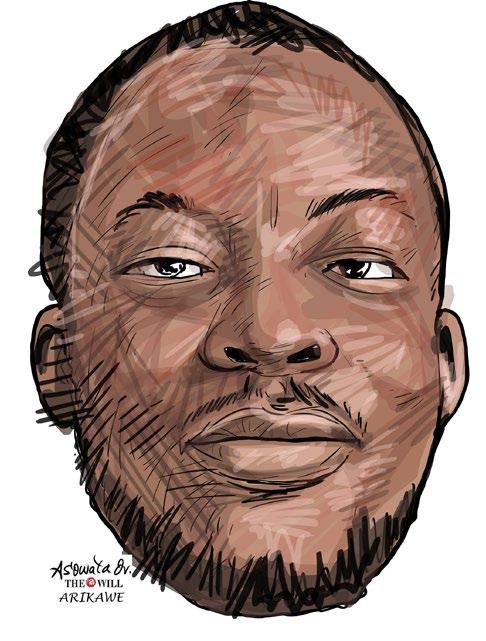
adapted to Nigeria’s unique economic and environmental landscape.
A holistic policy and regulatory framework is essential to drive the transition to a circular economy in Nigeria. This should begin with the introduction of Extended Producer Responsibility (EPR) programmes, which make manufacturers responsible for the end-of-life management of their products.
Additionally, tax incentives can be provided to companies adopting circular business models, such as remanufacturing, leasing, and productservice systems. Mandatory recycling targets for key sectors like packaging, electronics, and construction will create market demand for secondary materials. Finally, developing national standards for recycled content in manufacturing will stimulate the supply of high-quality recyclables.
One important pillar in the circular economy framework would involve infrastructure building. This includes modern waste sorting facilities to segregate materials at source, material recovery facilities to process and beneficiate recyclables and reverse logistics networks to channel waste streams back into productive use. Digitalisation will play a key role, with tracking systems powered by sensors and blockchain technology to monitor material flows. Demonstration of the viability of these technological interventions through pilot projects in major cities would subsequently act as a model for nationwide scale-up.
•Arikawe is a circular economy expert
Photo Editor: Peace Udugba [08033050729]
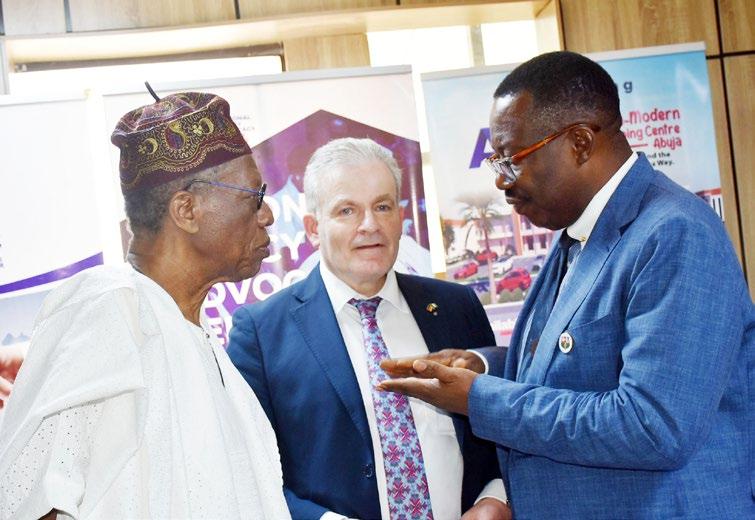

Information and
and Industry

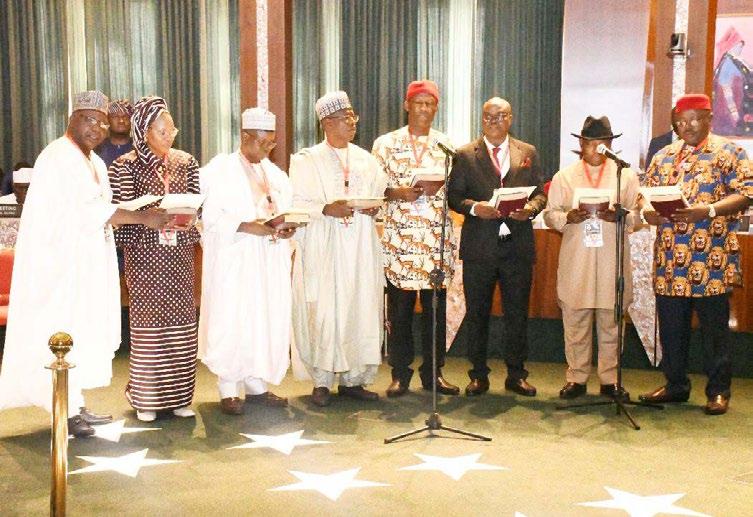
L-R: Chief Medical Director, Plateau State Hospital Management Board, Dr. Benjamin Sumi; representative of Chairman, Wase Local Government Area of Plateau, Nantip Padur and Commissioner for Health, Dr. Cletus Shurkuk, during the inauguration of One-Week-Free Medical Outreach to commemorate World Neglected Tropical Diseases (NTD) and inspection of renovation project of Federal Medical Center at Wase Local Government Area of Plateau on February 3, 2025.

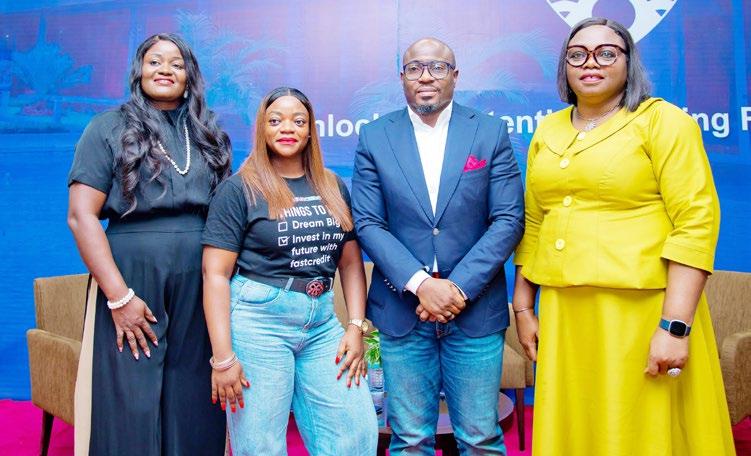





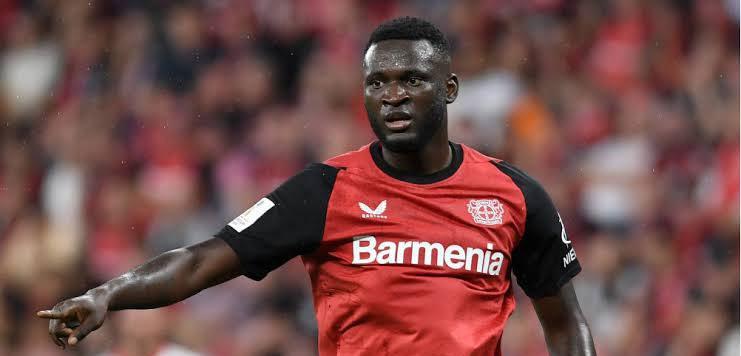
BY JUDE OBAFEMI
The world of football transfers often presents narratives more complex than initial appearances suggest. The recent story of Victor Boniface and Al Nassr provides a compelling exploration of how quickly professional football fortunes can transform, revealing the intricate dynamics of modern football negotiations. Victor Boniface, the Nigerian striker making significant waves at Bayer Leverkusen, found himself at the centre of intense transfer speculation.
Al Nassr, the Saudi Arabian club renowned for high-profile signings, including Cristiano Ronaldo and Senegalese star Sadio Mane, had initially targeted the talented forward with a proposed investment of over N60 million. The potential transfer represented more than just a financial transaction; it symbolised the changing landscape of global football and the increasing influence of emerging football markets.
The negotiations progressed smoothly, with personal terms reportedly agreed and medical examinations completed. For all practical purposes, the transfer seemed imminent. However, the potential move ignited substantial controversy, particularly among Nigerian football supporters who viewed the potential transfer with profound skepticism and deep concern.
Football fans, particularly in Nigeria, perceived the proposed move with significant apprehension. They interpreted the potential transfer to the Saudi Pro League as a perplexing decision, especially given Leverkusen’s extraordinary recent achievements. The team had accomplished the remarkable feat of going unbeaten last season, dramatically dethroning Bayern Munich and ending the serial champions’ long-standing dominance. Under Xabi Alonso’s tactical brilliance, Leverkusen had

transformed into a formidable European football force, with Boniface playing a crucial role whenever he was available and not sidelined by injury.
The context of Boniface’s potential departure was critical. Leverkusen were not merely a good team; they were a historic side that had shocked the footballing world. Their unbeaten season represented more than just a statistical achievement - it was a fundamental challenge to the established order of German football. Bayern, the league’s perennial champions, had been comprehensively outplayed and dethroned. In this context, Boniface was not just a player, but a key component of a potentially generationdefining team.
Supporters questioned the wisdom of leaving such a successful team for a league that, despite Ronaldo’s star power, had yet to establish genuine competitive credibility compared to Europe’s top footballing nations. The transfer seemed to many like a premature exit from European football precisely at the moment Boniface’s professional potential was reaching its peak.
In a surprising twist, Al Nassr abruptly changed direction. Instead of finalising the deal with Boniface, the club redirected its attention to Jhon Duran, the young Colombian forward from Aston Villa. The Saudi club ultimately acquired Duran for approximately N77 million, a move that dramatically altered Boniface’s transfer prospects and left many in the football world scratching their heads.
For Boniface, this unexpected development could have been a significant professional setback. However, the striker demonstrated remarkable professional composure in the aftermath. He smoothly reintegrated into the Bayer Leverkusen squad, resuming training and continuing to perform at a high level by coming off the bench to score the winner against Koln in the 98th minute of extra time and qualify Leverkusen fit the DFB Pokal semi-finals. It was a response that exemplified the mental strength required of modern footballers, who must navigate complex and often unpredictable transfer landscapes.

However, the transfer collapse became a moment of collective relief for Nigerian football enthusiasts. They interpreted the failed transfer as a preservation of Boniface’s sporting ambitions, preventing what many considered a potentially career-limiting move to a league perceived as secondary to Europe’s top competitions. The Saudi Pro League, despite significant financial investments, had not yet proven itself capable of matching the competitive intensity and developmental opportunities of European football.
This transfer saga offered profound insights into modern football’s transfer market dynamics. The increasing financial

power of emerging leagues is fundamentally reshaping global football transfers. Clubs can now make substantial investments previously considered unimaginable. However, financial resources alone do not guarantee sporting success or player development.
For Boniface, the incident underscores the importance of carefully considering professional career moves. Remaining at Leverkusen meant continuing to work under Xabi Alonso, competing at the highest European levels, and potentially winning significant trophies with a team that had already written its name in football history.
The financial proposition from Al Nassr was undoubtedly attractive. A transfer fee of over N60 million would be tempting for any footballer, especially one from a developing football nation. However, Nigerian fans and football experts viewed this potential move through a more strategic lens: sustained success in top-tier European competitions offers more long-term value than a lucrative but potentially career-stalling move to an emerging league.
Following the collapsed transfer, Boniface continued to demonstrate his professional value to Leverkusen. Though returning to the squad post injury, his performances remain consistently strong, contributing significantly to the team’s competitive efforts in the Bundesliga and European competitions. This continued excellence validated the belief that staying at Leverkusen was the right decision.
The transfer narrative provides broader commentary on current football transfer dynamics. The involvement of financially powerful clubs from emerging football markets is creating new professional movement patterns. Saudi Arabian clubs, in particular, are becoming increasingly active in pursuing international talent, challenging traditional football migration routes.
The Boniface transfer saga serves as a compelling reminder of football’s inherent unpredictability. It illustrates how complex professional negotiations can be, how quickly plans can change, and the importance of adaptability in modern sports. For young footballers, it offers a valuable lesson in career management, strategic thinking, and maintaining professional focus amid external pressures.
For Boniface, Leverkusen, and Nigerian football fans, this episode represents a unique moment of professional and sporting reflection. It underscores the intricate nature of football transfers, where financial considerations, strategic planning and individual performances intersect in unexpected ways.
The football world continues to evolve, with stories like Boniface’s captivating fans, players and clubs in the ongoing narrative of the beautiful game. Each transfer window brings new stories of ambition, strategy, and human drama, reminding us why football remains the world’s most beloved sport.
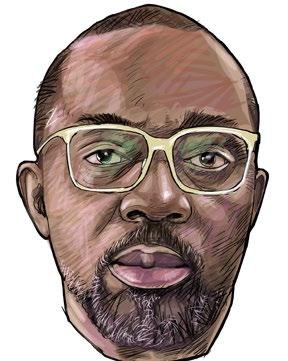

ogannah@thewillnews.com
The recent proposal by Nigeria’s House of Representatives to create 31 new states which I consider as a joke taken too far, has ignited a debate encompassing economic, administrative, and political concerns. This shocking and perplexing development which would increase the number of states from 36 to 67, necessitates a thorough examination of its implications on governance, national stability and the country’s long-term development trajectory.
Historically, state creation in Nigeria has been presented as a solution to various challenges, including ethnic tensions, demands for political representation and regional development aspirations. Since 1967, the country has transitioned from four regions to the current 36 states through multiple exercises, often driven by the need to manage ethnic diversity and promote inclusion.
However, these efforts have largely failed to deliver the expected economic prosperity, with many states struggling to sustain themselves. Most of the existing states depend heavily on federal allocations, and their inability to generate sufficient internal revenue has resulted in weak institutions, poor infrastructure, and deteriorating public services. This raises an important question: If the current states are barely functioning, what justification exists for creating 31 more?
Establishing new states involves substantial financial commitments, including setting up new administrative structures, recruiting civil servants and building infrastructure. Given Nigeria’s economic struggles—ranging from a high inflation rate to currency depreciation—the financial burden of creating and maintaining additional states is not viable. The country is already grappling with a huge debt profile, and expanding the number of states would only worsen fiscal pressures. The reality is that a larger administrative structure does not equate to better governance. Instead, it
often leads to inefficiency, as funds that should be directed towards essential services like healthcare, education, infrastructure and security are used to sustain an ever-expanding bureaucracy.
Beyond the financial concerns, there is also the risk of increased administrative inefficiency. Every new state would require its own executive, legislature, judiciary, and civil service, all of which would significantly increase recurrent expenditure. The bureaucratic duplication would make governance even more cumbersome and hinder efforts at national development. Additionally, the process of delineating new state boundaries could ignite disputes among communities, further deepening existing ethnic and regional tensions. Rather than creating more administrative divisions, Nigeria should focus on strengthening existing structures to enhance governance and service delivery. Politically, the push for new states is often driven by elites seeking greater access to federal resources. While proponents might argue that new states will address marginalisation and bring government closer to the people, history has shown that state creation does not automatically lead to better governance or economic prosperity. Instead, more often than not, it results in smaller, less viable entities that struggle to meet basic governance obligations. In my view, the focus should not be on the multiplication of states but on ensuring that existing ones function effectively.
An alternative approach would be to prioritise restructuring and administrative efficiency rather than expansion. A practical step in this direction is the implementation of the Stephen Oronsaye Report, which offers concrete recommendations on streamlining governance structures. Submitted in 2012 under the Goodluck Jonathan presidency, the report proposed the rationalisation and restructuring of federal government parastatals, commissions, and agencies to reduce costs and improve efficiency.

I want to recall that in February 2024, President Bola Tinubu directed its implementation, demonstrating a commitment to reducing administrative waste. The report advocates the merging of certain government agencies and the elimination of redundant ones, aiming to create a leaner and more effective government structure. We are still awaiting the full implementation of the report because when completed it would free up resources, reduce waste and improve governance outcomes.
Our federal legislators and their co-conspirators in this unserious bid should turn their focus into streamlining government and encourage existing states to adopt a similar approach as the Oronsaye commission. We do not need to create more states and local governments. What is required is for our elected officials and public servants to shun corruption and deliver good governance.
Given Nigeria’s economic struggles—ranging from a high inflation rate to currency depreciation—the financial burden of creating and maintaining additional states is not viable. The country is already grappling with a huge debt profile, and expanding the number of states